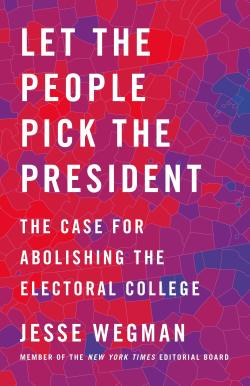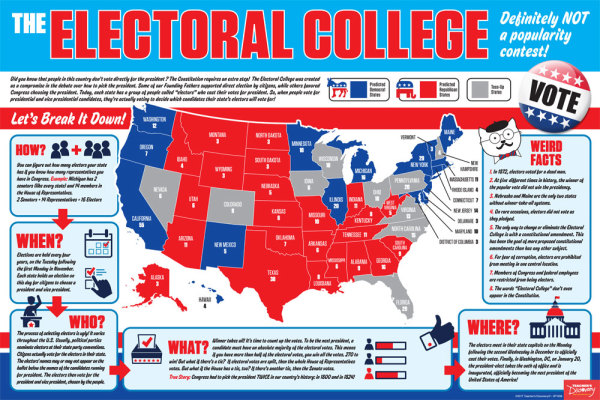Click HERE to enlarge
FRESH AIR: The U.S. has had two recent presidential elections in which the winner of the popular vote — Al Gore in 2000 and Hillary Clinton in 2016 — ultimately lost to the challenger for the seat. That’s because the U.S. has an Electoral College — each state gets a number of votes (by representative electors) in the Electoral College that’s proportional to its population. And 48 of the 50 states (Maine and Nebraska are the exceptions) have been awarding those electoral votes on a winner-takes-all basis.
But New York Times journalist Jesse Wegman says it doesn’t have to be that way: “The way the Electoral College operates today is not carved in stone,” he says. “The winner-take-all rule is really just a state invention. There’s nothing keeping us from changing it to a different method.” In his new book,  Let the People Pick the President, Wegman makes a case for abolishing the Electoral College. He notes that the winner-takes-all model means that millions of voters become irrelevant to a presidential election that is often decided by voters in key “battleground” states.
Let the People Pick the President, Wegman makes a case for abolishing the Electoral College. He notes that the winner-takes-all model means that millions of voters become irrelevant to a presidential election that is often decided by voters in key “battleground” states.
“There are millions of Republicans in ‘blue’ California and there are millions of Democrats in ‘red’ Texas,” he says. “All of those people just disappear when it’s time to actually cast the electoral votes, because those states use winner-take-all.” Wegman notes that there have been more than 700 attempts to reform or abolish the Electoral College since its inception. Recently, states began working together to create the National Popular Vote Interstate Compact, which would award the Electoral College votes to the candidate who wins the popular vote.
“If you’re okay with the way the Electoral College works right now, which is with a statewide winner-take-all rule in almost all states, I just don’t see what the argument is against using the winner-take-all rule, but for the whole country,” Wegman says. MORE

